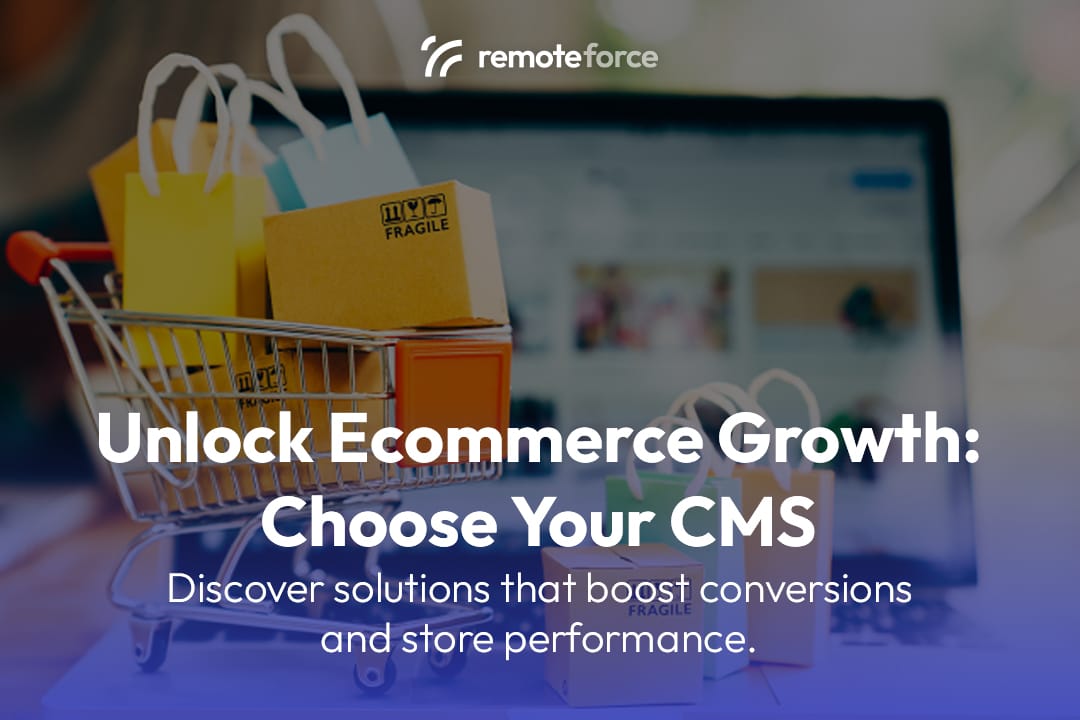In today’s competitive digital marketplace, launching an online store is just the first step. For your e-commerce business to truly thrive, you need a robust, flexible, and scalable platform that can handle everything from product listings and inventory to secure payments and customer management.
This is where choosing the right Content Management System (CMS) for e-commerce becomes critical. A well-selected e-commerce CMS is the foundation upon which your online store is built, directly impacting your operational efficiency, user experience, and ultimately, your sales.
If you’re looking to grow your online store, understanding the best CMS solutions for e-commerce success is key to making an informed decision. The right platform can streamline your operations, enhance the customer journey, and boost conversions and performance. Click to find the most efficient e-commerce CMS solutions and learn how to choose the perfect one for your business goals!
Table of Contents
ToggleKey Takeaways
Choosing the right E-commerce CMS is the single most critical decision that determines your store’s operational efficiency, security, and long-term ability to scale and generate profit.
- Foundation for Profit: An E-commerce CMS must provide specialized functionality: secure Payment Integration, Inventory Management, Robust Order Handling, and Customer Management. A standard CMS cannot handle these tasks reliably.
- Three Architectures: The decision is primarily based on architecture:
- Hosted SaaS (Shopify/BigCommerce): High ease of use, zero maintenance, fast setup. Best for speed and simplicity.
- Open Source (WooCommerce/Magento): Ultimate flexibility, full ownership, requires significant technical responsibility. Best for deep customization.
- Website Builders (Wix/Squarespace): Best for simplicity and visual appeal, limited for serious scaling.
- Platform Recommendations:
- Startups/SMBs: Shopify (speed to market) or WooCommerce (budget/control).
- Enterprises: Magento (for complexity/scale) or BigCommerce (for powerful SaaS scalability). * Total Cost of Ownership (TCO): Remember to factor in not just monthly fees, but also transaction fees, premium apps/plugins, development costs, and maintenance. Open-source is “free” but often has higher labor costs.
- Scalability & Security: Robust security (e.g., PCI compliance) and the ability to handle traffic spikes (especially during sales seasons) without crashing are non-negotiable must-haves.
The Digital Storefront: Beyond Basic Websites
An e-commerce website is far more complex than a typical informational site. It requires specialized functionalities that a standard CMS often cannot provide out-of-the-box. Key requirements for an e-commerce platform include:
- Product Management: Adding, editing, organizing, and displaying products with images, descriptions, and variants.
- Shopping Cart & Checkout: Securely processing orders and managing the entire purchasing funnel.
- Payment Gateway Integration: Connecting with various payment processors (credit cards, digital wallets, bank transfers).
- Inventory Management: Tracking stock levels to prevent overselling and streamline fulfillment.
- Order Management: Processing, shipping, and tracking orders efficiently.
- Customer Management: Handling customer accounts, order history, and communications.
- Security: Protecting sensitive customer and transaction data.
Choosing a CMS specifically designed or well-adapted for e-commerce is essential to ensure these critical functions are robust, scalable, and easy to manage.
Best CMS Solutions for Ecommerce Success: Top Platforms and Their Strengths

Let’s dive into some of the leading CMS solutions that empower e-commerce businesses, highlighting their unique advantages and ideal use cases.
1. Shopify: The User-Friendly Powerhouse
Shopify is a fully hosted, all-in-one e-commerce platform known for its ease of use, extensive features, and scalability, making it ideal for businesses of all sizes, especially those looking to get online quickly with minimal technical hassle.
- Strengths:
- Ease of Use: Intuitive interface, drag-and-drop store builder, and quick setup. No coding required for basic operations.
- Hosted Solution: Shopify handles all hosting, security, and maintenance, so you don’t need to worry about server management.
- Extensive App Store: A vast marketplace of apps for almost any imaginable e-commerce need (marketing, shipping, accounting, etc.).
- Robust Features: Built-in tools for inventory, order management, marketing, analytics, and SEO.
- Scalability: Can handle everything from small boutiques to large enterprises (Shopify Plus).
- Ideal For: Small to medium-sized businesses, startups, dropshippers, and anyone prioritizing simplicity and speed to market.
- Considerations: Monthly subscription fees, transaction fees if not using Shopify Payments, customization can be limited without coding knowledge compared to open-source options.
Expert Insight: “Shopify democratized e-commerce,” states a prominent e-commerce strategist. “Its simplicity and powerful app ecosystem make it a go-to for anyone who wants to sell online without getting bogged down in technical complexities.”
2. WooCommerce (for WordPress): The Flexible Open-Source Giant
WooCommerce is a free, open-source e-commerce plugin that turns any WordPress website into a fully functional online store. It combines the power and flexibility of WordPress with robust e-commerce capabilities.
- Strengths:
- Highly Customizable: Being open-source and built on WordPress, it offers unparalleled flexibility for design and functionality. You have full control over your site’s code.
- Vast Ecosystem: Access to thousands of WordPress themes and plugins for extended features (SEO, marketing, security, etc.).
- Cost-Effective: The plugin itself is free, though you’ll pay for hosting, themes, premium plugins, and development.
- SEO Friendly: Benefits from WordPress’s inherent SEO capabilities and dedicated SEO plugins.
- Community Support: Large and active community for support and resources.
- Ideal For: Businesses that already use WordPress, those needing extensive customization, developers, and businesses on a tight budget for core platform costs.
- Considerations: Requires more technical knowledge for setup, maintenance, and security; you’re responsible for hosting and updates.
3. Magento (Adobe Commerce): The Enterprise Powerhouse
Magento (now Adobe Commerce) is an open-source e-commerce platform (with a paid enterprise version) renowned for its powerful features, immense scalability, and flexibility, making it suitable for large enterprises and fast-growing businesses with complex needs.
- Strengths:
- Unmatched Scalability: Designed to handle massive product catalogs, high traffic volumes, and complex operations.
- Robust Features: Advanced marketing, SEO, multi-store capabilities, international commerce, and analytics built-in.
- Extreme Customization: Offers the highest degree of customization and flexibility for unique business requirements.
- Large Developer Community: A strong community of developers specialized in Magento.
- Ideal For: Large enterprises, rapidly scaling businesses, and those with highly specific, complex e-commerce requirements.
- Considerations: Requires significant technical expertise (development and maintenance), higher development and hosting costs, steeper learning curve.
Also Read: Best Open Source CMS Platforms for 2025
4. BigCommerce: Scalability Without Open-Source Complexity
BigCommerce is a SaaS (Software as a Service) e-commerce platform that aims to combine the ease of use of a hosted solution with the scalability and robust features typically found in open-source platforms.
- Strengths:
- Strong Built-in Features: Less reliance on apps compared to Shopify for core functionalities.
- Scalability: Designed for growth, handling high sales volumes and large product catalogs effectively.
- Multi-Channel Selling: Excellent support for selling across multiple channels (social media, marketplaces).
- No Transaction Fees: No additional transaction fees regardless of payment gateway used.
- Good SEO Tools: Strong built-in SEO capabilities.
- Ideal For: Medium to large businesses, those focused on multi-channel sales, and businesses needing powerful features without managing their own hosting.
- Considerations: Tiered pricing based on sales volume, less design flexibility than WooCommerce/Magento for highly unique aesthetics.
5. Squarespace/Wix Ecommerce: The Designer-Friendly Options
While primarily known as website builders, Squarespace and Wix also offer integrated e-commerce functionalities, providing highly visual, template-driven solutions.
- Strengths:
- Stunning Templates: Known for their beautiful, professional design templates that are easy to customize.
- Ease of Use: Drag-and-drop interfaces make it simple for beginners to build a store.
- All-in-One Hosted: Includes hosting, security, and support.
- Ideal For: Small businesses, creatives, artists, and those who prioritize stunning visual design and simplicity for selling a limited number of products.
- Considerations: More limited scalability and fewer advanced e-commerce features compared to dedicated platforms, less customization flexibility.
Choosing the Best CMS for Your Ecommerce Success
Selecting the right e-commerce CMS depends entirely on your specific business needs, budget, technical expertise, and growth projections.
- For Startups/Small Businesses: Shopify offers speed and ease. WooCommerce provides cost-effectiveness and flexibility if you’re comfortable with WordPress.
- For Growing/Medium Businesses: Shopify, BigCommerce, or a well-managed WooCommerce setup are strong contenders.
- For Large Enterprises/Complex Needs: Magento (Adobe Commerce) or a highly customized BigCommerce solution will provide the necessary power and scalability.
Consider factors like:
- Budget: Platform fees, transaction fees, development costs, app/plugin costs, hosting.
- Features: What specific functionalities do you need?
- Scalability: How much growth do you anticipate?
- Technical Expertise: Do you have internal developers, or will you rely on external agencies?
- Customization Needs: How unique does your store need to be?
- SEO: Ensure the platform supports robust SEO features.
Conclusion: Your Platform, Your Path to Profit
Choosing the best CMS solutions for e-commerce success is one of the most pivotal decisions you’ll make for your online business. The right platform serves as the engine that powers your sales, streamlines your operations, and enhances every customer interaction.
Whether you prioritize ease of use, extreme customization, enterprise-level scalability, or a balance of features, understanding the strengths of leading platforms like Shopify, WooCommerce, Magento, and BigCommerce is key to making an informed choice that truly boosts your conversions and performance.
If you’re navigating the complexities of selecting and implementing the ideal e-commerce CMS, or if you need expert development to customize and optimize your online store for peak performance, professional guidance is invaluable.
At RemoteForce, we specialize in comprehensive web and app development services, with a dedicated focus on building high-performing e-commerce solutions. Our team of experts can help you choose the perfect CMS, design a captivating online store, integrate essential functionalities, and optimize it for speed, security, and search engine visibility, ensuring your e-commerce venture thrives.
Beyond web and app development, RemoteForce also offers digital marketing, graphic design, secretarial, legal, and accounting services, providing a holistic suite of solutions to empower your entire business.
Ready to build an e-commerce store that converts and scales? Contact RemoteForce today to discuss your e-commerce CMS and development needs!
Frequently Asked Questions (FAQ)
1. What are the “transaction fees” charged by platforms like Shopify?
Transaction fees are a small percentage of each sale that the platform charges in addition to the fees charged by the payment processor (like Visa/Mastercard). Shopify waives these fees if you use their native solution, Shopify Payments, but charges them if you use a third-party gateway (like PayPal or Stripe directly). BigCommerce is generally known for not charging transaction fees regardless of the payment gateway you choose.
2. When should a small business choose WooCommerce over Shopify?
A small business should choose WooCommerce if:
- They already have a WordPress website and want to integrate e-commerce seamlessly.
- They require highly unique, non-standard customization for their product pages or checkout process.
- They want full control over their hosting environment and code.
- They aim to keep monthly subscription fees low (only paying for hosting/plugins).
3. How does the CMS handle local taxes and regional shipping (relevant for Singapore)?
All major e-commerce platforms (Shopify, WooCommerce, BigCommerce) are designed to handle complex regional logistics. They allow you to:
- Set up tax zones based on customer location (e.g., applying GST).
- Configure shipping rules based on weight, cart value, or postal code, and integrate directly with local carriers (e.g., SingPost or regional courier APIs).
4. What does “PCI compliance” mean, and why is it important for an e-commerce CMS?
PCI DSS (Payment Card Industry Data Security Standard) compliance refers to a set of security standards designed to ensure that all companies that process, store, or transmit credit card information maintain a secure environment. It is critical because:
- Hosted Platforms (Shopify, BigCommerce): They handle the vast majority of PCI compliance for you, simplifying your legal and security obligations.
- Self-Hosted Platforms (WooCommerce, Magento): You are primarily responsible for ensuring your hosting, server configuration, and custom code meet these rigorous security standards.
- What Is Logo Design? A Complete Guide to Creating Memorable Brand Marks - February 2, 2026
- What Is Brand Identity? The Complete Guide to Building Recognition - February 2, 2026
- How Graphic Design Works: A Step-by-Step Process Guide - January 30, 2026



